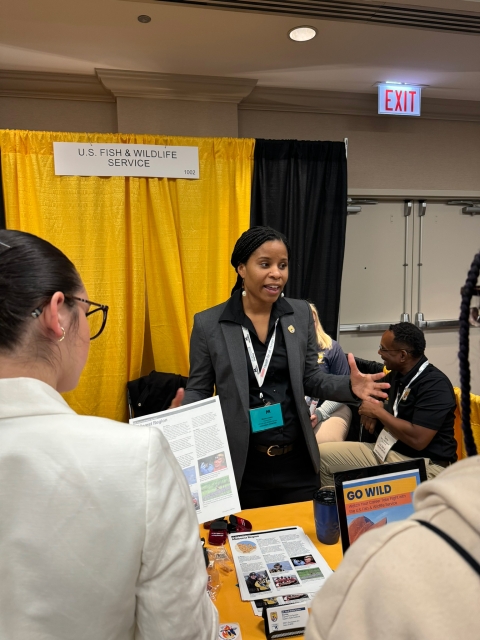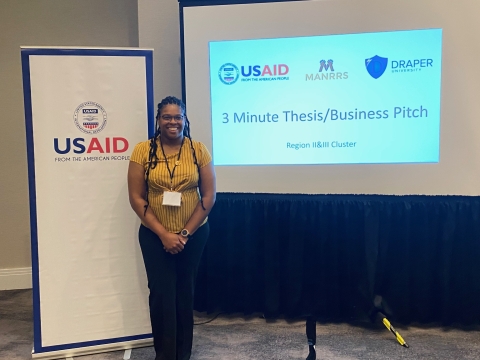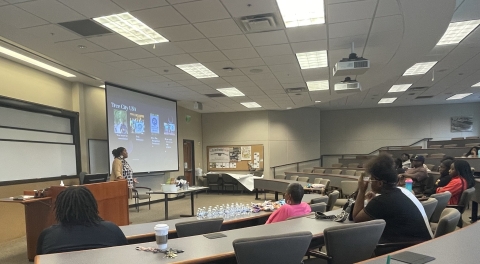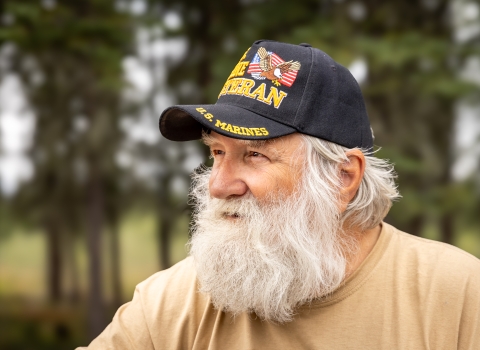In our ongoing mission to protect wildlife and conserve natural habitats, we at the U.S. Fish and Wildlife Service recognize the importance of diverse voices and perspectives. One organization that stands out in its efforts to promote diversity and inclusion in our field is Minorities in Agriculture, Natural Resources, and Related Sciences (MANRRS). The agency participates in the national MANRRS conference and regional events to support and recruit individuals from underrepresented groups who bring unique perspectives and innovative solutions to the field of conservation.
What is MANRRS?
Imagine a network where students and professionals from diverse backgrounds come together, driven by a passion for agriculture, natural resources, and environmental sciences. This is MANRRS—a national organization founded in 1985 in Michigan with a mission to promote academic and professional advancement for minorities in these crucial fields. With over 74 collegiate chapters, 36 Junior MANRRS chapters, and more than 19,000 members across the United States, MANRRS provides members with valuable resources, mentorship, and opportunities to thrive.
Impact and achievements
MANRRS has made remarkable strides in advancing diversity and inclusion. Each year, the organization hosts a national conference attended by thousands of students and professionals, including MANRRS juniors, undergraduates, graduates, and industry leaders. This event brings together all aspect’s students need to succeed, including educational training sessions, inspiring speakers, and numerous networking opportunities. The most recent national conference in Chicago was the most widely attended to date sold out of registrations, showcasing the growing influence and reach of MANRRS.
Students attend the MANRRS national conference seeking internships and careers, connecting with representatives from more than 200 companies such as Cargill, Land O’Lakes, Syngenta, and the U.S. Department of Agriculture. These companies offer students and professionals access to a broad spectrum of career opportunities and industry insights.
Voices from the field
Shanice Jones, an interdisciplinary conservation biologist with the U.S. Fish and Wildlife Service, highlights the value of MANRRS: "MANRRS provides one of the largest platforms to interact with students from diverse backgrounds and perspectives attending universities and colleges across the nation. These are some of the best and brightest students seeking a future in agriculture, natural resources, and related sciences."
Jennifer Hinckley, a regional fire manager in California, attended the MANRRS career fair in Chicago and was impressed by the turnout and engagement. "I was amazed at how many people attended the conference and the variety of booths from companies and agencies. It was fantastic to talk to people about fire, answer questions about fire and intersection with ecology, and discuss the technical aspects of wildland fire. Students were particularly interested in the technology we use, such as the satellite notification system maintained by NASA and automatic weather stations. I loved seeing the diversity in both people and thoughts at the crossroads of fire. With so many challenges posed by climate change climate change
Climate change includes both global warming driven by human-induced emissions of greenhouse gases and the resulting large-scale shifts in weather patterns. Though there have been previous periods of climatic change, since the mid-20th century humans have had an unprecedented impact on Earth's climate system and caused change on a global scale.
Learn more about climate change , we need everyone's ideas on how to make things better."
Sheniqua Glover, a Ph.D. candidate at Auburn University and the Region 3 Vice President for MANRRS, shares her experience: "As a graduate student at Auburn, I found MANRRS through a social event just by chance. Initially, I didn’t think my Ph.D. discipline in veterinary medicine biomedical science would align, but I was motivated to connect with a community that shares my academic and professional interests while also promoting diversity and inclusion. Attending MANRRS conferences got me to think outside the box. I was exposed to opportunities outside of traditional jobs in my field, which allowed me to use my professional and technical skills to advance other fields in agriculture and natural resources."
Benefits of agency participation
Shanice highlights the importance of MANRRS for professionals: "I attend MANRRS as a professional member, representing the U.S. Fish and Wildlife Service, participating as a Judge for Student Contests, assisting with the Career Fair, and partnering with other Conservation Agencies. On behalf of the agency, I made many connections with students as well as other conservation partners to identify opportunities for student experiences in the conservation field and prepare the future workforce."
Recommendations for students
Sheniqua encourages other students to attend MANRRS conferences: "The most valuable component of attending is the opportunity for networking with industry professionals, researchers, and other students, which can lead to valuable connections and future career trajectories. The career fair and networking sessions are especially useful for identifying internships and job openings, as well as understanding the skills and needs employers are looking for."
Enhancing future involvement
Based on her experiences, Shanice suggests: "Our agency can enhance future involvement with MANRRS by increasing attendance and recruitment as well as the student opportunities that we share with students here."
As we continue to work towards a more inclusive and sustainable future, it's important to recognize and learn from organizations like MANRRS. Their dedication to diversity, education, and professional development aligns perfectly with our mission and values. There is an opportunity to enhance conservation efforts and ensure that they reflect the rich diversity of the communities we serve.
Sheniqua sums it up beautifully: "Attending the MANRRS conference is like opening a door to endless possibilities in your personal, academic, and professional journey. Joining MANRRS means becoming part of a family that supports diversity, cultivates leadership, and inspires innovation in agriculture, natural resources, and related sciences."






